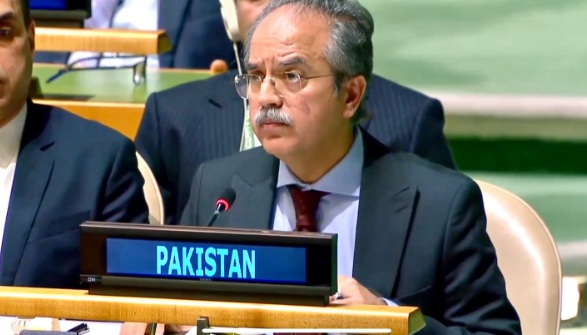UNITED NATIONS, Jun 21 (APP): Pakistan called for addressing injustices that perpetuate conflict — unresolved & long-running situations of foreign occupation, systemic discrimination and the denial of self-determination rights — as the UN Security Council debated the implications of poverty, underdevelopment and conflict on Thursday.
“Poverty, exclusion, inequality, and the denial of fundamental rights are not just development concerns – they are among the deep-rooted structural causes of conflict,” Ambassador Asim Iftikhar Ahmad, permanent representative of Pakistan to the UN, told the 15-member Council.
“Without addressing these underlying drivers, peace efforts will remain incomplete, fragile and short-lived,” he emphasized.
“A principled and consistent application of international law, the UN Charter and relevant Security Council resolutions is essential to peace, justice and stability.”
The Pakistani envoy also stressed the need for “equitable and timely” resolution of debt crisis as also of a broader effort to address climate change and economic distress.
At the outset, UN Secretary-General Antonio Guterres said it is no coincidence that 9 of the 10 countries with the lowest human development indicators are currently in a state of conflict. If current trends continue, two-thirds of the world’s poor will live in conflict-affected or fragile countries by 2030.
While there is no better way to prevent conflict than investing in development, unfortunately, “we are losing ground”, the UN chief stressed. The world is falling short by over $4 trillion annually in the resources developing countries need. These countries are also being battered by the limited fiscal space, crushing debt burdens and skyrocketing prices.
Noting the upcoming fourth Conference on Financing for Development starting next week, Guterres said it’s vital to renew public and private finance commitments for development. “We need to provide urgent debt relief for countries drowning in unsustainable debt service”, he said, also stressing the need to reform the global financial architecture.
In his remarks, Asim Iftikhar, the Pakistani envoy, said that sustaining peace requires more than military responses, including enhancing the Security Council’s role in conflict prevention by strengthening preventive diplomacy and promoting the peaceful settlement of disputes.
“And our response to intra-state situations or complex crises should continue to embed development considerations into peacekeeping and peacebuilding efforts,” he said, adding that this requires stronger collaboration with the ECOSOC, the Peacebuilding Commission, and UN development actors.
National governments have the primary responsibility for peace and development, the Pakistani envoy underscored, with the international community and this Council supporting their efforts.
“We cannot speak of lasting peace without addressing the structural conditions that undermine development,” Ambassador Asim Iftikhar said, pointing out they are burdened by unsustainable debt, hunger and worsening climate shocks. D
“Despite their resources, despite their wealth, they are often at the receiving end of the scramble for, and exploitation of resources that favours the developed world. Many are trapped in unfair and inequitable global systems that perpetuate poverty and under-development.”
The world needs $4.2 trillion annually to meet the SDGs (Sustainable Development Goals), the Pakistani envoy highlighted, saying it was achievable. The steps include:
— Additional issuance of, and further Rechanneling of Special Drawing Rights (SDRs);
— Recapitalization and Strengthening of Multilateral Development Banks;
— Fulfillment of ODA (Official Development Assistance) and climate finance commitments;
— Fair, development-oriented trade policies, and;
— Just international taxation systems.
The upcoming Financing for Development Conference (FFD4) is a critical moment to take bold, practical actions for a meaningful way forward – to keep the development engine strong and running, Ambassador Asim Iftikhar said.
“We must not allow poverty to continue sowing the seeds of conflict,” he said in conclusion.

